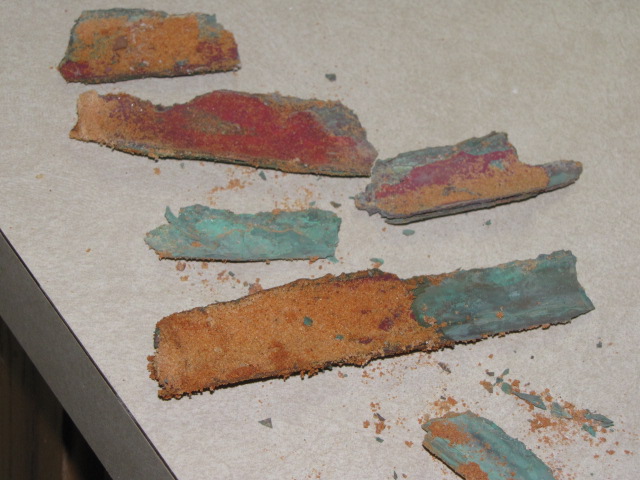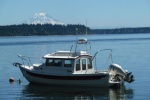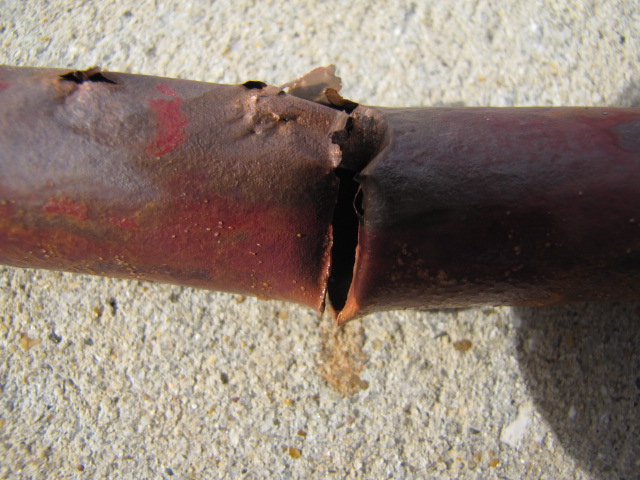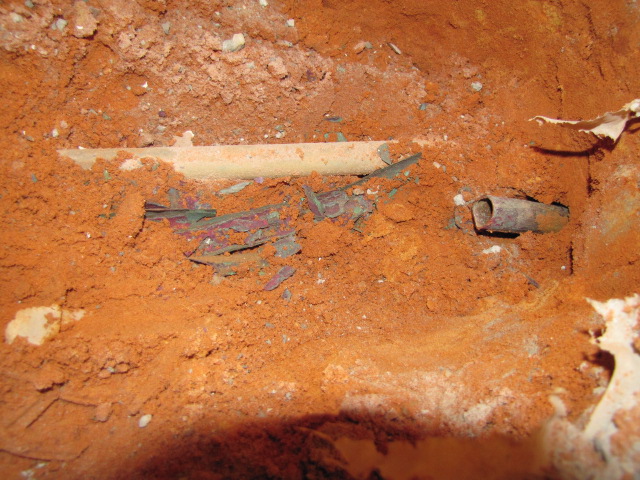| View previous topic :: View next topic |
| Author |
Message |
thataway
Joined: 02 Nov 2003
Posts: 21364
City/Region: Pensacola
State or Province: FL
C-Dory Year: 2007
C-Dory Model: 25 Cruiser
Vessel Name: thataway
Photos: Thataway
|
 Posted: Thu Jan 22, 2009 11:33 pm Post subject: Plumbing help Posted: Thu Jan 22, 2009 11:33 pm Post subject: Plumbing help |
 |
|
I have a problem which has me a bit puzzled, and although it is not directly C Dory related, I hope that some of the members have some good ideas as to what is causing the problem.
Several days ago I noted a warm area of the utility room floor. Yesterday evening: no hot water or water pressure. We shut off the hot water and this AM "American Leak Detectors" pinpointed the leak ($285 right where it was hot several days ago).
The plumber was here for about 4 hours, and the 3/4 inch soft copper hot water pipe buried 6" under the 5" re-inforced slab is completely shot. It looks like bark peeling off a tree. The house is only 8 years old. The cold water pipe is fine. We are going to have to replumb the entire hot water system--through the atic. This is a 3600 sq foot 4 bath house, with some ceilings as high as 16 feet, so not an easy job. But that is life.
The plumber thinks it was a lightning strike. I think perhaps some form of electrolysis. Any thoughts:

_________________
Bob Austin
Thataway
Thataway (Ex Seaweed) 2007 25 C Dory May 2018 to Oct. 2021
Thisaway 2006 22' CDory November 2011 to May 2018
Caracal 18 140 Suzuki 2007 to present
Thataway TomCat 255 150 Suzukis June 2006 thru August 2011
C Pelican; 1992, 22 Cruiser, 2002 thru 2006
Frequent Sea; 2003 C D 25, 2007 thru 2009
KA6PKB
Home port: Pensacola FL |
|
| Back to top |
|
 |
journey on
Joined: 03 Mar 2005
Posts: 3598
City/Region: Valley Centre
State or Province: CA
C-Dory Year: 2005
C-Dory Model: 25 Cruiser
Vessel Name: journey on
Photos: Journey On
|
 Posted: Thu Jan 22, 2009 11:46 pm Post subject: Posted: Thu Jan 22, 2009 11:46 pm Post subject: |
 |
|
Bob, any time a C-Brat starts with the word "Help", or "Advice" we know we've got a live one.
Lightning destroys by high current, and the resultant IR heat melts things. As far as I can see, nothing is melted, and the other choice is corrosion. Is there any voltage between the hot water heater and ground? That would explain electrical corrosion. Higher water temp could cause chemical corrosion and actually that's what it looks like. At least from California.
Check with your neighbors, and see if they've been corroded also.
Good luck, boris |
|
| Back to top |
|
 |
garyk
Joined: 19 Feb 2007
Posts: 70
City/Region: Ketchum
State or Province: ID
C-Dory Year: 2006
C-Dory Model: 255 Tomcat
Vessel Name: AMIGO 11
Photos: Amigo II
|
 Posted: Fri Jan 23, 2009 12:23 am Post subject: Plumbing help Posted: Fri Jan 23, 2009 12:23 am Post subject: Plumbing help |
 |
|
Bob,
Sorry, It does look like a mess. It seem to me you are assuming, all the hot water pipes thru out the house are in a simular condition as the section that deteriorated. I hope your assumption is incorrect.
I had a simular condition in a 1/2 bath in the lower floor of my home. It is also the closes to the hot warer tank. The problem was isolated to the hot water pipe under the cabinet, easy fix.
The hot water line under your slab turns up to access your first sink, faust. etc. I would locate that or an easy line, coming out of the slab and cut a section to determine if the corrosion is continuous, or isolated. If it only effects the pipes under the slab , I would run the new lines outside the foundation, You can get by with that in Florida, not here in Idaho or Alaska, Intercept the 3/4 hot water line a convevent place to feed the system. I hope it will be that simple.
Gary |
|
| Back to top |
|
 |
thataway
Joined: 02 Nov 2003
Posts: 21364
City/Region: Pensacola
State or Province: FL
C-Dory Year: 2007
C-Dory Model: 25 Cruiser
Vessel Name: thataway
Photos: Thataway
|
 Posted: Fri Jan 23, 2009 12:39 am Post subject: Posted: Fri Jan 23, 2009 12:39 am Post subject: |
 |
|
Lightning does strange things down here.I agree that usually it melts and fuses. It can cause perforations in pipes--and fuse sand, plus travel through the wet ground and water. Our thoughts is that lightning in wet soil may act differently than in dry and hotter environments. But ou bring up good points!
This almost looks like the prop on the Cal 46 after a strike took out the diode on the alternator and the new owner was allowing 130 amps of 12 volt DC to go to "ground". The only direct electrical connection with these pipes is a bathroom Jacuzi tub. Good suggestion to check the current and voltage potentials. I'll do this in the AM. We have several ground rods--on the Genset, the main pannel, the pool/jacuzzi and the dock. All of these are in good shape. No direct ground to the water pipe, except it is in earth.
We did loose the power supply in a computer when I was gone to Calif in Dec (melted capaciters and resisters--no other problems, and it was on a good surge protector).
Gary, the under the slab piping is soft copper tubing. We thought it went directly to the kitchen sink, but that was not to be. After cutting the wall, there is no manufold. We think that the 3/4" line goes to one of the bathrooms, and then is reduced to 1/2" and returned to the sink. Tomarrow we are going to high pressure (air) test these lines. The half inch look OK so far. But the sink is basically on an island, so we have to back feed from some other area. We may just abandon all of the line under the floor, except this one. It will be easier and better cosmetically to run new water lines in the attic than outside. We do have decent access (one walk in and one trap door) to the attic and can ID where the sink walls are. What is strange is that we thought that the 3/4" water line went to the sink, and then split to 1/2" to each bath. It now appears that the 3/4" line to one bath, and then splits back to the other bath and kitchen. When we are through we will put in a circulating hot water pump (on a timer). We had a circulating hot water system on the boat. This conserved water and made sure we always had hot water,
We also have the name of the plumber who did the original install, and my plumber will be calling him first thing in the morning.
Thanks and "keep them coming"!
Bob |
|
| Back to top |
|
 |
AstoriaDave
Joined: 31 Oct 2005
Posts: 994
City/Region: Astoria
State or Province: OR
|
 Posted: Fri Jan 23, 2009 12:42 am Post subject: Posted: Fri Jan 23, 2009 12:42 am Post subject: |
 |
|
Bob, three thoughts:
1. Where is the electrical ground for the house? Is it OK?
2. What is your water source? Well? Municipal water?
3. Have you replaced the hot water heater? I assume it is an electric model -- is it wired in properly? Does it have an element that has lost its insulation?
I agree some sort of electrolysis/misdirected current must be the cause.
For the copper to corrode like that, it would have to have become the default ground, perhaps carrying current for something else that has a short to ground, I think. What could have failed?
You got me puzzled, for sure!
_________________
Dave Kruger
Astoria, OR |
|
| Back to top |
|
 |
Doryman
Joined: 03 Oct 2006
Posts: 3807
City/Region: Anacortes
State or Province: WA
C-Dory Year: 2006
C-Dory Model: 255 Tomcat
Vessel Name: Lori Ann
Photos: Lori Ann
|
 Posted: Fri Jan 23, 2009 12:55 am Post subject: Posted: Fri Jan 23, 2009 12:55 am Post subject: |
 |
|
Bob, I would also suggest you consider the possibility of substandard materials, e.g., impurities or manufacturing defects in the piping itself. Maybe the builder cut some corners? Maybe the supplier did? Maybe just bad pipe?
I will now return to lurking in discussions totally above my pay grade. 
Warren
_________________
Doryman
M/V Lori Ann
TomCat 255, Hull #55, 150 Yamahas
Anacortes, WA
 |
|
| Back to top |
|
 |
Dreamer
Joined: 01 Jan 2006
Posts: 1766
City/Region: Really Sunny SaddleBrooke
State or Province: AZ
Photos: Dreamer
|
 Posted: Fri Jan 23, 2009 1:15 am Post subject: Posted: Fri Jan 23, 2009 1:15 am Post subject: |
 |
|
Bob,
We built our house in 2001 and they suggested and used plastic plumbing instead of copper, partly because of the problems they were seeing in the imported copper pipe. I'm now very glad they did. I'd suggest using it for the repairs.
Won't your homeowners insurance cover this? I sure hope so for your sake.
I have zero expertise in this area, so I won't hazard a guess as to the cause. Best of luck.
_________________
Roger

Once a C-Brat, always a C-Brat
Dreamer- Sold 25 Feb. 2013 |
|
| Back to top |
|
 |
Notayot
Joined: 03 Feb 2005
Posts: 122
State or Province: WA
C-Dory Year: 2006
C-Dory Model: 22 Cruiser
Vessel Name: Notayot (sold 2/2018)
Photos: Notayot
|
 Posted: Fri Jan 23, 2009 2:27 am Post subject: Posted: Fri Jan 23, 2009 2:27 am Post subject: |
 |
|
There are two possible sources of corrosion of copper piping I have seen. First, is the corrosion on the inside or outside of the pipe. If it is on the outside (doesn't look like this in the photo), it may be galvanic corrosion in the ground, and the pipe in the walls etc will be OK. It will be the pipe in contact with the ground that will need to be replaced. This shows up many times in utility energy audits when the customer complains of a high bill.
The second form of corrosion is internal to the pipe, and this can be galvanic due to dissimilar metal forms, ie: the pieces of pipe, joints, fittings and elbows may be dissimilar alloys. It can also be due to corrosive water flowing in the pipes. It can also be cavitation or grain boundary corrosion due to high water speed in the pipes. I have seen this in homes and restaurants that have a recirculating hot water pump to have instant hot water in the whole house. It usually shows up in elbows and fittings where the water changes direction, and usually on the outside of the turn. I recommend only running the pump when you are going to use hot water due to the high probability of cavitation or grain boundary corrosion due to the water speed in the pipes. This kind of damage will be on the inside of the pipes, and will be throughout the hot water piping of the house.
Good luck.
_________________
 |
|
| Back to top |
|
 |
rogerar
Joined: 10 May 2008
Posts: 146
City/Region: SW FL
State or Province: FL
C-Dory Year: 1999
C-Dory Model: 22 Cruiser
Vessel Name: Duck
Photos: Duck
|
 Posted: Fri Jan 23, 2009 5:13 am Post subject: Posted: Fri Jan 23, 2009 5:13 am Post subject: |
 |
|
You could install small tankless instant hot water heaters at each bathroom, kitchen, laundry, etc., since your cold water pipes are good.
Roger |
|
| Back to top |
|
 |
BrentB
Joined: 15 Jul 2006
Posts: 4420
City/Region: Greenwood
State or Province: IN
Photos: BrentB
|
 Posted: Fri Jan 23, 2009 9:11 am Post subject: Posted: Fri Jan 23, 2009 9:11 am Post subject: |
 |
|
Is your hot water heater pipes grounded across the cold and hot lines? Is it electrolysis from the hot water heater? Is the anode worn? Just a bunch questions from a bystander.
Our Fl home was built in 50's and has solid heavy wall copper pipe and no problems to date and definitely not soft. If you replace with PET or something using no metal please post an update.
I expect someday we will face the same issue.
_________________
Brent Barrett |
|
| Back to top |
|
 |
marvin4239
Joined: 06 Feb 2007
Posts: 1165
City/Region: Jacksonville Florida/Wilmington NC
State or Province: FL
C-Dory Year: 2007
C-Dory Model: 22 Cruiser
Vessel Name: C-FLE II
Photos: C-FLE II
|
 Posted: Fri Jan 23, 2009 9:51 am Post subject: Posted: Fri Jan 23, 2009 9:51 am Post subject: |
 |
|
What about the anode in the hot water tank? I guess it's actually there to protect the tank rather than the piping but with these sort of problems I'd check it. I'm assuming you have and electric hot water heater. Also with mulitple grounds if they aren't all tied together I've seen problems with stray voltages between the grounds. Ideally all ground rods should be tied together but this isn't always practical or possible. Also I think where the line is connected to the water tank their is suspose to be some sort on insulator to prevent galvonic reactions from the dissimiliar metals with a ground wire bridging the connection. On the subject of PVC versus copper I would much rather have PVC for a number of reasons corrosion being number one on the list. Good luck sounds like you've got quite a project to keep you busy.
_________________
marvin |
|
| Back to top |
|
 |
lloyds
Joined: 02 Aug 2005
Posts: 1724
City/Region: sublimity
State or Province: OR
C-Dory Year: 1996
C-Dory Model: 22 Cruiser
Vessel Name: undecided
Photos: 1996 22 Cruiser (Lloyds)
|
 Posted: Fri Jan 23, 2009 11:04 am Post subject: Posted: Fri Jan 23, 2009 11:04 am Post subject: |
 |
|
| looks like electrolysis. If it in fact is there are measures that a proactive shop up on technology can guard against. It is a huge problem in coastal areas. It has eaten up the bridges on the west coast so bad that they are now experimenting with changing new construction to stainless rebar. If it is electrolysis there are ways to install galvanic protection but I don't have a clue how they do it. |
|
| Back to top |
|
 |
thataway
Joined: 02 Nov 2003
Posts: 21364
City/Region: Pensacola
State or Province: FL
C-Dory Year: 2007
C-Dory Model: 25 Cruiser
Vessel Name: thataway
Photos: Thataway
|
 Posted: Fri Jan 23, 2009 12:24 pm Post subject: Posted: Fri Jan 23, 2009 12:24 pm Post subject: |
 |
|
Thanks for all of the answers! What a great group!
To answer some questions: Gas waterheater. Home owners does not cover. No anode on the external lines from the heater. Heater is 8 years old, original. There is no AC or DC voltage or current from the hot water pipe in the ground or at the water heater to house ground, to ground rod and to the cold water pipe measured with a sensitive DVM.
We will be replumbing with flexable plastic through the attic. The problem is that we have to trust the 1/2" cppper pipe to the sink, since it is in essence on an Island (access from the ceiling is almost impossiable.
The hole in the pipe was on the bottom. The exfoliation of the layers of pipe were external. The bore of the pipe is clean and no corrosion. There was no debris or particlulate matter in the water heater when drained.
Hole in the pipe:
 |
|
| Back to top |
|
 |
C-Hawk
Joined: 02 Nov 2003
Posts: 2150
City/Region: Carpinteria / Channel Islands
State or Province: CA
C-Dory Year: 2008
C-Dory Model: 22 Cruiser
Vessel Name: C-Hawk
Photos: C-Hawk
|
 Posted: Fri Jan 23, 2009 12:24 pm Post subject: Posted: Fri Jan 23, 2009 12:24 pm Post subject: |
 |
|
Two questions-
Was the copper wrapped?
Can you see the marking on what is left of the copper?
Copper buried in the ground should be wrapped, especially if you have corrosive soils in your area.
Copper used for water supply should be no less than Type L. You can identify Type L by the blue marking on the copper. If the copper has red (Type M) marking, you should have the builder replace at his cost-- it will not meet code.
Type M is allowed above ground in, or on, a building or underground outside of structures.
Good luck
_________________
Roger
2002- CD22- "Fishtales" returned to factory 2008
2008- CD22- "C-Hawk" Sold
KJ6VVB
A Brat I am, At sea I be
God is Great, Beer is Good.... and People are Crazy |
|
| Back to top |
|
 |
thataway
Joined: 02 Nov 2003
Posts: 21364
City/Region: Pensacola
State or Province: FL
C-Dory Year: 2007
C-Dory Model: 25 Cruiser
Vessel Name: thataway
Photos: Thataway
|
 Posted: Fri Jan 23, 2009 12:36 pm Post subject: Posted: Fri Jan 23, 2009 12:36 pm Post subject: |
 |
|
The lot is on a sand peninsula. 6 feet of sand was removed, and 12 feet of "Red dirt" from Alabama was put on the lot, impacted and allowed to settle for 3 years before bulding the house. This dirt is high in iron content, I am not sure about other minerals, but it is not from salt water areas.
Here is a photo of the pipe end and the material which exfoliated from it in the "red dirt".

The intact pipe is the cold water pipe and there is absolutely no evidence of corrosion. |
|
| Back to top |
|
 |
|

 Search
Search Private Messages
Private Messages Profile
Profile Log in
Log in Register
Register Help
Help






